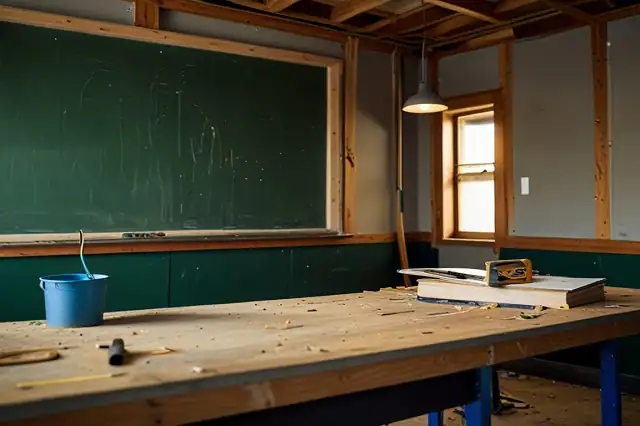Teachers are vital in forming the future, and although they devote their lives to improving society, many of them are unable to pay for the necessary home repairs and renovations. To help teachers upgrade their living areas without incurring additional costs, there are free home improvement grants for teachers available.
We will cover all the information educators require to obtain home improvement grants in this guide, giving you insightful advice to streamline and expedite the process.
What Are Home Improvement Grants?
Free home improvement grants are non-repayable financial aid provided by the government, nonprofits or neighborhood groups. Whether it is repairing leaky roofs, increasing energy efficiency, or even remodeling old spaces, these grants are intended to assist homeowners with necessary repairs, renovations or improvements.
Given the low pay, many teachers receive free home improvement grants can be an amazing financial lifeline for them. Public employees, such as teachers, are frequently the focus of these grants, which recognize their community service and relieve some financial strain.
Difference Between Grants and Loans
Differentiating between grants and loans is crucial. For those who qualify, grants are essentially free money, but loans have interest attached to them. Teachers also have the option of home improvement loans, but grants are preferred since they do not increase personal debt.
Why Are Teachers Eligible for Special Grants?
The future of society is directly impacted by the work that teachers do, and they are frequently regarded as community leaders. As a result, numerous grant programs provide unique funding opportunities tailored to teachers, acknowledging the financial limitations they face. You can get grants to help you accomplish your goals, whether they are to modernize an old house, fix structural damage, or increase energy efficiency.
Read- Free Energy Efficient Window Replacement Grants For Teachers
Types of Home Improvement Grants for Teachers
Federal Home Improvement Grants
Teachers can apply for a variety of federal grants to help pay for home renovations and repairs. Frequently programs operated by organizations such as the U. S. Department of Housing and Urban Development (HUD), and the U.S. Department of Agriculture (USDA).
Read- Free Home Repair Grants For Low Income Veterans: From the VA
HUD Home Improvement Grants
Community Development Block Grants (CDBG) which are offered by HUD, provide money for home repairs, particularly in areas with low to moderate incomes. Although it is not specific to teachers educators who fulfill the income requirements might qualify.
USDA Single Family Housing Repair Loans and Grants
USDA’s Section 504 Home Repair Program provides grants to low-income homeowners, including teachers, up to $10000 for rural teachers. The goal of this program is to eliminate risks to health and safety in homes.
Read- Senior Discounts For Window Replacement- Guide For Homeowners
State-Specific Home Improvement Grants
Free home improvement grants are available in many states with a focus on educators. Take this example.
Housing improvement funds are one of the many teacher assistance programs that California provides through the California Housing Finance Agency (CalHFA).
Free home repair grants are available to teachers in Texas through regional initiatives that support housing and neighborhood revitalization.
See what programs are available for teachers by contacting the housing or education department in your state.
Local and Community-Based Grants
Additionally a lot of local governments and cities provide grants to enhance housing conditions and neighborhoods. These programs are frequently accessible to teachers because of their position in public service. Additionally some neighborhood groups manage community revitalization initiatives that offer financial aid for home renovations especially for public servants like teachers.
The Teacher Next Door initiative, for instance, assists educators in locating housing assistance and, in some places, may provide home improvement grants or rebates. Because they frequently offer grants, especially for educators, it is worthwhile to look into neighborhood nonprofits that concentrate on housing improvement.
Eligibility Requirements for Teachers
There are some common factors to take into consideration though the eligibility requirements for teacher home improvement grants can vary depending on the program.
Employment Status
Candidates for the majority of grants must be full-time teachers employed by public or charter schools. Private school teachers may be eligible for some grants, though this varies by program. Teachers might be required to present documentation of their employment, such as an employment contract or letter.
Income Level
A large number of home improvement grants are intended for families with low to moderate incomes. Teachers are more likely to be eligible if they are in these income ranges. To demonstrate your income, you might be required to present pay stubs or tax returns.
Location of the Property
Certain grants, particularly those provided by local programs or the USDA, are only accessible in particular regions. For instance, USDA grants frequently give priority to rural areas, whereas city-funded initiatives aimed at enhancing neighborhoods may be available in urban areas.
Type of Home Improvement
Typically grants specify the types of home improvements they will pay for. For instance, aesthetically pleasing improvements like a kitchen makeover are less likely to be approved than health and safety repairs like roof or electrical system repairs. To make sure your project is eligible always review the grants specific requirements.
How to Apply For Home Improvement Grants For Teachers
It can be intimidating to apply for home improvement grants but by following these steps the process will go more smoothly and efficiently.
Research Available Grants
Start by looking into grant programs at the local and national levels. Look for ones that are directed especially at public employees or teachers. Information is available via:
Federal websites like Grants.gov
State housing authorities
Local government websites
Nonprofit organizations
Check Eligibility
Once possible grants have been found make sure you meet the eligibility requirements by going over them. Keep a close eye on the types of home improvement projects covered location restrictions and income limits.
Gather Documentation
Prepare all the necessary documents in advance. This might include:
Proof of employment (e.g., teacher contract)
Income verification (e.g., pay stubs, tax returns)
Property ownership documents (e.g., deed or mortgage statement)
Detailed estimate of the home improvement project’s cost
Read- Homeowners Grants $15000 For Energy Efficient Windows and Doors
Submit a Detailed Application
The application procedure will differ for each grant program. Make sure you give accurate information adhere closely to the instructions, and turn in all necessary paperwork. A written proposal outlining the need for the money and it is intended use may be required for some grants.
Follow Up
Do not be afraid to contact the granting organization again after submitting your application. It is critical to remain involved in the process and respond quickly to any queries or requests for more documentation.
Tips to Maximize Your Grant Application Success
The following advice will help you improve your chances of receiving home improvement grants.
Start Early
Grant money is extremely competitive and frequently scarce. Getting started on your application process early allows you more time to collect the necessary materials and send in a compelling application ahead of schedule.
Focus on Essential Repairs
Make essential home repairs like fixing energy-saving or health and safety problems a top priority. The likelihood of grant funding for these kinds of projects is higher than that of purely aesthetic improvements.
Combine Grants with Other Resources
Do not hesitate to submit more than one grant application. To pay for a project entirely federal state and local funds can frequently be combined. In addition search for rebates or low-interest loans to supplement grant money.
Keep Track of Deadlines
The deadlines for various grants may vary. To prevent disqualification, make sure all necessary documentation is submitted on time by keeping track of submission deadlines.
Leverage Teacher Assistance Programs
Teachers may be eligible for teacher assistance programs that offer mortgage assistance, down payment assistance or special incentives for purchasing homes in specific areas in addition to home improvement grants. Teachers living conditions can be improved more successfully by combining these resources.
Read- Free $15000 Roof Replacement Grants- Roof Repair Programs
Common Mistakes Teachers Make When Applying for Home Improvement Grants
Although home improvement grants are a great way to get much-needed financial relief, applicants should be aware of some common mistakes.
Inadequate Documentation
Applications are frequently rejected for lack of accurate or comprehensive documentation. Always confirm requirements and make sure all submissions are made in the right format.
Misunderstanding Eligibility Requirements
Make sure you comprehend all of the requirements for each grant’s eligibility. It is pointless to apply for a grant for which you are ineligible. Certain grants are restricted to rural or urban regions, for instance, and others might have stringent income requirements.
Applying for the Wrong Type of Project
Certain project types like necessary repairs or energy-efficient upgrades are usually funded by grants. A cosmetic makeover such as a new backsplash for the kitchen might not be in line with the grants objectives.
Other Funding Options for Teachers
Although grants are a great way to pay for home renovations there are other options as well. In order to finance their home remodeling projects educators can look into additional funding sources such as.
Low-Interest Home Improvement Loans
Teachers can apply for low-interest loans from certain organizations. These loans offer an affordable means of funding more extensive home renovation projects that grants might not be able to cover in full.
Energy Efficiency Rebates
Several states and utility companies provide rebates to homeowners who upgrade their insulation or install solar panels, among other energy-efficient upgrades. Your project’s cost can be greatly decreased with these rebates.
Read-Free Energy-Efficient Window Replacement Grants For Veterans
Tax Credits
Certain home improvements like upgrades that use less energy might be eligible for federal tax credits. This further lowers the total cost of your renovation by lowering your tax liability.
Conclusion
For educators who want to update, renovate, or repair their homes, teacher home improvement grants are a fantastic resource. You can accomplish your goals without going over budget by applying for grants to improve energy efficiency, address important structural problems, or just make your living area more comfortable.
Teachers can access these valuable funds and make much-needed home improvements by understanding the grants that are available putting together a strong application and avoiding common mistakes. Teachers can focus on what they do best—shaping the future—while making their ideal home a reality with the correct strategy.